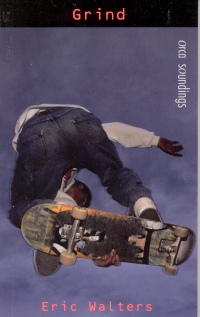| ________________
CM . . .
. Volume XI Number 8 . . . . December 10, 2004
The first person narrator of Grind, Philip Falcone, is in his mid-teens and hates school. His parents want him to "get serious" and find an interest that can "lead to a career or at least make money." Skateboarding with his friend, Wally, is what Phil lives for. At their favourite location behind a store, they try new feats while eluding security guards. There, they meet a professional skateboarder a few years their senior who is being videotaped for his website. They learn that a web page can attract advertisements and sponsors and make money. After observing the pro miss an attempted stunt, Phil realizes that "maybe they [professionals] weren't that much different - or better - than me." Soon Phil invites his former girlfriend, Lisa, and Wally to a meeting with the school's computer wizard, Niven, to discuss the creation of their own skateboarding website. They form a partnership and videotape their stunts, exulting in their abilities: "The screen showed me skating, then jumping on the rail, grinding toward the camera at breakneck speed, getting bigger and bigger, until the camera dropped and the board blotted everything out." The web page is wildly popular, and the four are approached by a skateboard manufacturer who wants to sponsor the site. "We all made over thirty dollars while we slept," Niven reports. But the pressure to do more dangerous tricks lands Wally in hospital with a break that requires a pin in his leg and retirement from the game. After a discussion with Wally, Philip resolves to do a relatively safe, though socially daring, stunt for the web page - perhaps his last - and to apologize to Lisa. Grind deserves a more enticing title for it is a well-structured, briskly paced, realistic novel, with more "showing" than "telling" and no moralizing. The multi-dimensional characters learn through experience. As the novel progresses, Philip is revealed as more than just an unacademic teenager battered and bruised from his hobby. He demonstrates organizational and "people" skills by bringing together, as equals, a young woman, his skateboarding pal of Polish origin, and a gifted younger student (who is probably more of a misfit in school than an academically challenged individual with athletic ability). Phil achieves what his parents want - a money-making project that they could not have envisioned. The paramount importance of peer friendships is acknowledged when Phil apologizes to Wally for cheering him on to perform a dangerous stunt. Wally says, "It's good to have people believe in you." Less convincing is Phil's situation with Lisa. Formerly, they were "with" each other, but during the time frame of the novel, she is hostile to him for having "cheated" on her by kissing another girl at the movies. This sounds too 1950s for a 2004 novel. Lisa resembles Cindy Lou in The Buddy Holly Story. Is it typical for 15-year-olds to have exclusive relationships nowadays? On balance, however, Grind is a well-written work of literature that subtly shows that a weakness can also be a strength. It affirms the worth of young women (Lisa), new Canadians (Wally), the academically gifted (Niven) and those, like Phil, with talents that are not obvious at first. Recommended. Ottawa's Ruth Latta had her mystery novel for grown-ups, Tea with Delilah, published in November 2004, by Baico Publishing, Gatineau, PQ.
To comment
on this title or this review, send mail to cm@umanitoba.ca.
Copyright © the Manitoba Library Association. Reproduction for personal
use is permitted only if this copyright notice is maintained. Any
other reproduction is prohibited without permission.
NEXT REVIEW |TABLE OF CONTENTS FOR THIS ISSUE
- December 10, 2004.
AUTHORS
| TITLES | MEDIA REVIEWS
| PROFILES
| BACK ISSUES
| SEARCH | CMARCHIVE
| HOME |
